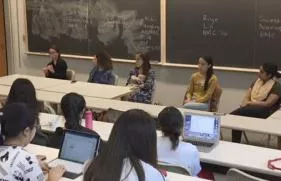This article appeared in the Fall 2017-Spring 2018 Bryn Mawr Math Alumnae Newsletter.
“A Bryn Mawr math degree has equipped me with a voice and has empowered me to succeed in a male dominated field.”
So spoke Kirsten (Kiki) Huskey, A.B./M.A. ’06, at a panel discussion included in Bryn Mawr’s annual celebration of Math Appreciation Week. Kiki had returned to her alma mater along with several other recent math major alumnae to talk about their career paths. In doing so, they advocated for math by sharing how much it has helped them post-graduation. In this article we share several of their stories.
Sasha Bereznak ’11 works at Vanguard, where she manages quantitative equity groups and compares the relative attractiveness of securities. Her work helps Vanguard guide its decision-making process. On any given day, she manages about a dozen exchange-traded funds, and is responsible for day-to-day trading decisions. She is also involved in research; she assesses business risks and the robustness of the business models that Vanguard uses. One piece of advice that Sasha gives to current students is to take a computer science course. A big question of the evening was how being a math major at a women’s college has helped each panelist. For Sasha, who entered a male-dominated career, simply being a Bryn Mawr graduate gave her a good reputation, as outsiders know that Bryn Mawr graduates have emerged from a challenging four years. Having a background in mathematics gave Sasha additional credentials, and allowed her the confidence to command respect from her peers.
Elisabeth Johnson ’15 is pursuing a master’s degree in mathematics at Drexel University. In addition to fulfilling her course requirements, she teaches classes and leads recitation sessions. On how math has helped her after graduating from Bryn Mawr, she explains that a Bryn Mawr math degree has cultivated her critical thinking skills, and taught her to think outside of the box. While at Bryn Mawr, Elisabeth developed a strong relationship with several faculty members, and believes that building a strong community and having connections is crucial to anyone’s future success. Elisabeth highlights the importance of studying computer science, given that coding is ubiquitous in the workplace nowadays. Her advice for current undergraduate students is to network as much as possible since collaboration is so important. She also believes that if you are passionate about something, then you should pursue it with full force. You should not let yourself be discouraged, even if it seems that you may not possess all the skills required to apply for a certain job. There will always be opportunities to learn on the job. Many companies offer training for their employees, and the option of teaching yourself is always there. Elisabeth agrees with the other panelists that a math degree from Bryn Mawr has helped her to distinguish herself from others, and to build confidence. It has allowed her to be taken seriously, especially in a male-dominated field.
Kiki Huskey ’06 leads the Controls, Operations, and Regulatory Compliance Team at Chatham Financial. Her day-to-day work includes managing the risk of fluctuations in interest and currency-exchange rates, negotiating contracts, helping clients comply with regulations, and serving on the recruiting team. Her job requires the ability to teach herself and to quickly take on something new. Kiki explains that the proof-writing and problem-solving skills she learned at Bryn Mawr provided a solid foundation for her career. Having worked for Chatham’s recruiting team, Kiki strongly recommends that students take full advantage of the career development resources on campus to get help with resumes, cover letters, interviews, and more. She also encourages students to take as many classes that interest them as possible, and highlights the usefulness of being familiar with spreadsheet models.
Ziye Lin ’16 is an actuarial developer at iPipeline. Her work involves developing software for iPipeline’s customers. She also serves as a business analyst, and manages the firm’s insurance distribution policy. She ensures that her clients comply with financial regulations, and creates future projections of insurance policies. She says she learns something new at work every day. Being a math major at Bryn Mawr has helped her develop the skills needed to learn new things and to excel at work. She believes that math challenged her intellectually, and has helped her learn to think abstractly. Math has also made her adept at recognizing patterns and identifying relationships. Her advice for current students is to always have a study partner because collaboration is crucial and expected everywhere. She further recommends that students keep their options open and be flexible. That way they can find something else in the case that the first job they land does not truly motivate them. And because the job market changes over time, Ziye thinks that it is a good idea to have another option to fall back on.
Swetha Narasimhan ’15 teaches at The Workshop School, an elementary school in Philadelphia. She agrees that a math major has helped her in her career. She has applied many of the concepts that she learned at Bryn Mawr in her workplace, and her mathematical training has helped her cultivate critical thinking skills. A math major has also helped her distinguish herself from other applicants, and has helped her learn to think creatively. This is a precious skill in a workplace where there are no set rules.
Swetha echos the other panelists when she explains that majoring in math has helped her to find a voice and to be taken seriously. Her advice to current undergraduates is to be open-minded and to take any courses that interest them. She encourages students to be willing to experiment and to obtain knowledge about new things. She says you never know what you will apply to your job, or what will make you more employable.
Overall, the panelists gave great advice and inspiration to current students. All are outstandingly accomplished in their respective fields.

